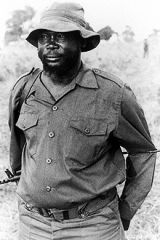East Africa mourns Garang, fears unravelling peace
By C. Bryson Hull
NAIROBI, Aug 2 (Reuters) – East Africa mourned the death of Sudan’s vice president, former rebel leader John Garang, which many fear may jeopardise years of work to build peace and undermine an African-built success in southern Sudan.
 Garang’s weekend helicopter crash shortly before reaching his destination in south Sudan — called New Site — caused despair not only among Sudanese, but among east Africans who worked hard to solve the 21-year-old civil war there.
Garang’s weekend helicopter crash shortly before reaching his destination in south Sudan — called New Site — caused despair not only among Sudanese, but among east Africans who worked hard to solve the 21-year-old civil war there.
Garang led the Sudan People’s Liberation Movement (SPLM) in a war against the Muslim Khartoum government, pushing for equal treatment for people in the south of Africa’s largest country.
Southern Sudan’s peace agreement, signed in January, was seen as not just a victory for Sudan, but proof Africa could solve its own troubles — a mantra on a continent where many feel outside influences have created more problems than solutions.
In Kenya, which hosted the peace talks and was where the peace agreement was signed to joyous celebration, the sadness was acute.
“As a black sister, as a Kenyan and as a peace advocate, I’m terribly wounded, and particularly so because my people have lost yet another chance to be free,” said one former Kenyan official who worked on the peace agreement.
Along with Sudan, Kenya and Uganda both declared a three-day mourning period and ordered flags flown at half-mast.
Garang’s struggle and eventual victory in securing peace earned him many accolades around the world, but Africans were among his most fervent admirers.
Ugandan President Yoweri Museveni in a statement called Garang “one of the most visionary and incisive revolutionary thinkers and nationalists Africa has ever produced”.
DEVASTATING EFFECT
Hopes in the region rose when more than a million Sudanese on July 9 thronged the streets of Khartoum when he was sworn in as first vice president of the government he fought since 1983.
“This is a devastating effect on the peace process. Our morale is low and it came at the wrong time,” said a Kenyan envoy involved in regional peace efforts.
“I hope the people of southern Sudan and the Sudan government will not lose the momentum,” the envoy said. “I’m sure Dr. Garang wanted this peace pact to outlast his life. This agreement was made for posterity and generations to come.”
Concern of a backslide in south Sudan was evident in an eloquent line from Kenyan President Mwai Kibaki’s condolence message, where he expressed hope that Garang’s absence would not jeopardize the peace achieved so far.
“Indeed, the consolidation of the peace is the greatest honour the people of Sudan can bestow on the departed soul,” Kibaki wrote.
Ethiopia’s government called Garang’s death “a devastating blow” to all peoples in Sudan and the region.
“This is also a tragic loss for Africa as a whole,” the Foreign Affairs Ministry said in a statement.
